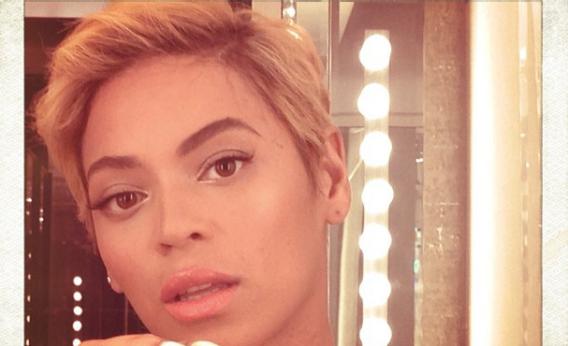Goodbye, flowing caramel-brown waves. Hello, peroxide-blond pixie cut. Beyoncé posted images of her new hairstyle on Instagram on Thursday, and she looks amazing, and everybody loves her. Loving Beyoncé is divine law, like loving thy neighbor, except so much easier. We adore not only the woman but everything she sings, doesn’t sing, says, does, touches, sheds impossible golden light upon, or otherwise ennobles with her presence. So, right, the hair. “Short, sweet, and pretty,” raved the Cut, a site actually named after Beyoncé’s latest move. “This is a mandatory haircut now,” Vulture announced. “Who Has the Best Short Hairstyle, Beyoncé or These Other People?” BuzzFeed asked, before concluding, in all caps, “STOP COMPARING BEYONCE TO ANYBODY ELSE BECAUSE SHE IS LITERALLY ON A WHOLE OTHER LEVEL.”
Being obsessed with Beyoncé has become more than a fad—it’s a cultural requirement. On Twitter and Facebook, in conversation, in blogs, we outdo one another declaring her amazingness. Even criticism (of the star’s carefully controlled documentary, for instance, or of her photo embargo) comes prefaced with a million disclaimers about how we wouldn’t complain, except Bey is so awesome that it pains us to see her anxiously micromanaging her brand. Here’s my favorite line from a recent open letter to the Queen, asking her to reconsider her press firewall: “First of all, I love you. Please remember as we go forward that I am unshakably convinced that you are a magical she-stallion of blinding, white-hot radness.”
Beyoncé is special, an eternal exception. In a climate that favors disaffection and antagonism, where many cultural products are either ironic or meant to be enjoyed ironically, she is one thing we’re allowed to unreservedly love. Cities full of hipsters bow down at her name. Grown people—like Mindy Kaling—cry at her concerts. Drake writes infatuated raps about her. Serena Williams tweets love letters. She posts a photo of herself in a hot tub with Blue Ivy and America’s moms don’t even get that mad about it.
Is it because she really does seem to have it all: talent, business acumen, beauty, fame, money, the husband, the baby? Is it the way she straddles power and sexiness? Is it the sheer virtuosic uniqueness of her music, her looks, her voice? (Are her music, looks, and voice actually orders of magnitude more brilliant than other stars, or does she just have the world’s most accomplished marketing team? Just kidding! Love you, Bey!)
Perhaps, unlike Demi Lovato, who you imagine journaling with at a sleepover, or Pink, who you imagine teaching you to pole dance, Beyoncé has baked diva worship into her image: Interacting with Bey means bowing down (bitches); there is no other way. Or maybe her hardworking, goal-oriented façade aligns with our values. (“If you don’t like her, you respect her,” offered a co-worker.) Maybe the push-pull between her discipline and her art gives us a rich psychological puzzle to mull over. (In the definitive Beyoncé think-piece of 2013, Nitsuh Adebe calls the star’s oeuvre an “examination of how it feels when drive and discipline really are your organic personality, and your feelings fight against layers of self-control and pragmatism, and the documentary you make about yourself shows you working hard to relax and experience your own emotions.”) Perhaps there’s something safe and unchallenging in Knowles’ perfection—a megawatt blandness that makes her easy to love.
Whatever the reasons, our embrace of the new haircut—great as it is! I want it!—was a foregone conclusion. Loving Beyoncé is the law of the land, a signal that we are genuine people, despite our ironic affectations.
